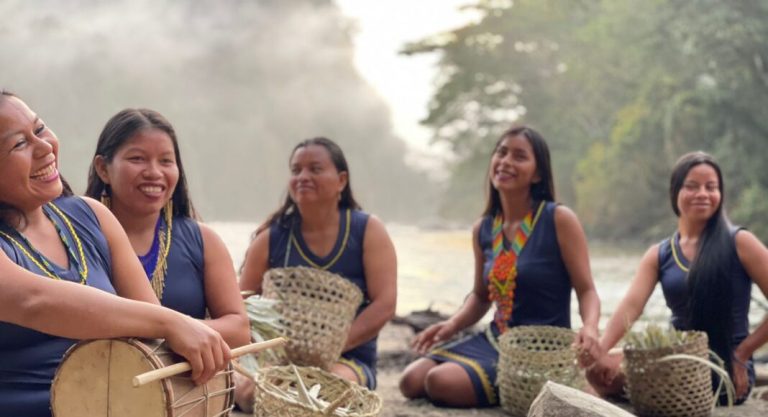
Yuturi Warmi, Ecuador’s first Indigenous guard led by Kichwa women
10 January, 2025In 2020, over 40 Kichwa women began to organise themselves in defence of their territory and to expel mining from the Ecuadorian Amazon. This is how Yuturi Warmi, the first Indigenous guard led by women in the region began. This interview with María José Andrade Cerda of Yuturi Warmi was originally published by Mongabay Latam and has been translated for LAB by Rebecca Wilson. Article republished courtesy of Latin America Bureau, see the original here. Sign up to Latin America Bureau’s newsletter for similar stories.
Maria Jose Andrade Cerda, one of the leaders of Yuturi Warmi, explains that Indigenous women have an integral vision for territorial defence. Accordingly, Yuturi Warmi’s work doesn’t only include physically guarding and overseeing their territory, but also includes the defence of their culture, ancestrality, language, education, and health.
Yuturi ants are peaceful until their territory is threatened. This species, also known as the ‘conga ant’, is considered to be a warrior in Amazonian Kichwa Indigenous culture, as these bugs don’t allow anyone to enter their home without permission – just like the women of Serena, an Indigenous community located on the banks of the Jatunyacu river in the upper part of the Napo river in the Ecuadorian Amazon.
Yuturi Warmi first decided to come together to increase their families’ income through making and selling handicrafts, but when their territory was increasingly threatened by mining, they stepped up in its defence.
Today they are the first Indigenous guard led by Kichwa women in all of Ecuador, with over 40 members organised against all forms of interference in their territory, including the contamination of their rivers and destruction of the forest.
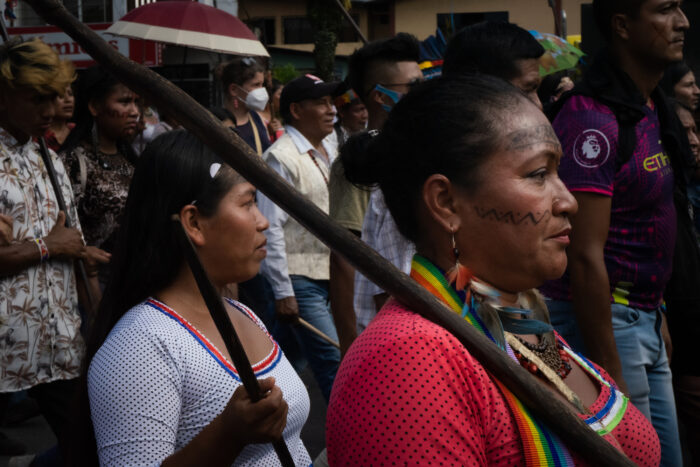
Yuturi Warmi translates to ‘conga-ant women’. ‘We are getting organised against the systematic attack of illegal mining,’ María José Andrade Cerda affirms, ‘in fact all forms of mining in our territory, Napo province, are illegal.’
Majo, as she is called by friends and family, is 28 years old and one of the younger leaders of Yuturi Warmi. Mongabay Latam spoke with Majo about how the group is organised, the challenges they face as women, and their vision for defending their territory.
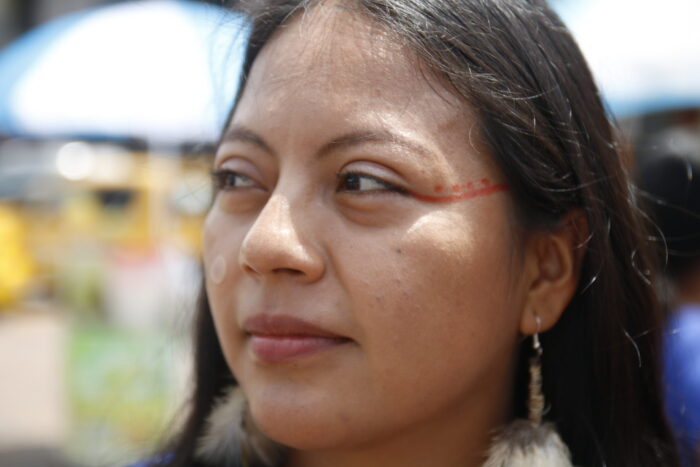
Mongabay: How has life changed in Serena since the miners arrived?
María José Andrade Cerda: Since the miners arrived, we’ve lost our sense of peace. Now we are constantly on alert so that the miners, as well as operators and agents who work for the mining companies, don’t set foot on our land or try to talk to our leaders, families, or other community members. We’re also now less connected with other communities. They’ve turned against us because we defend our territory and because we don’t want mining here, while other communities along the Jatunyacu river have succumbed to the miners. The connection, the solidarity between pueblos, has been lost. This is what hurts us most.
Life, in itself, has changed, although we have always been vigilant, always watching our backs; there is special interest in our community and in our ancestral territory because it is a focal point of resistance.
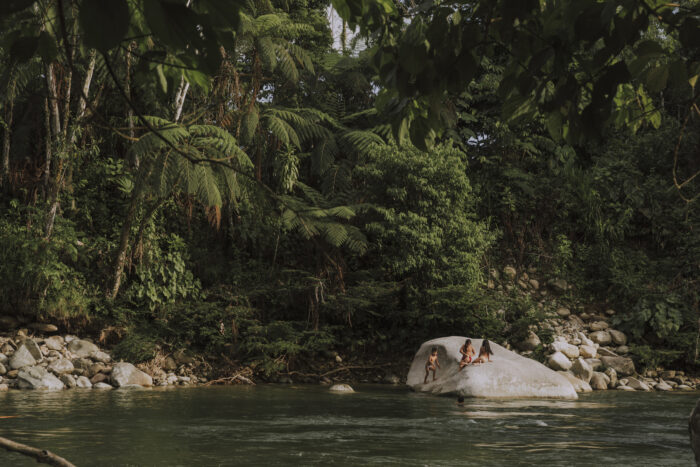
What I’ve heard from communities downstream is that the supays, the spirits of the forest, are moving, they have been agitated. Atacapi, the seven-headed boa, has been seen around the Shandia community, where he didn’t often appear before. The communities say that the large boas are rising up the river, because the river there isn’t deep enough for them anymore and the water feels too hot, it feels different to them because of the mining operations and the pollution they’re releasing into the river. All of this alters the way of life of the water spirits, too. And this affects us in the way we feel within our territory.
Lower down the river, we are also seeing the colour of the water change. The children and all of us who bathe in the river have sensed this change. It’s about how we, as a people who have always lived next to the river, know it and interpret it. When there’s pollution, we feel it, not just physically in our skin, but also spiritually.
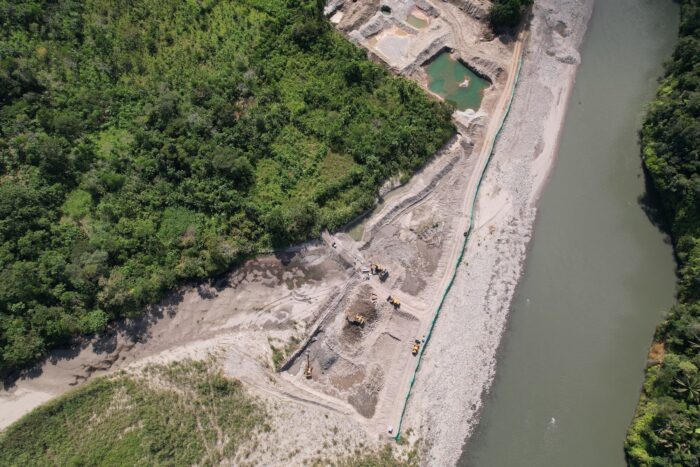
How did you begin to defend your territory? Did the arrival of mining lead you to dedicate your life to this work?
I’m one of the few people who left the community to study. I never thought this [destruction] would happen in my territory. As we are far away, forgotten, abandoned, we never thought the extractive industries and the capitalist ideals of the State and these companies would reach us here.
However, in February 2020, our territory – the Jatunyacu river basin in the upper part of the Napo river – was granted to a mining company. This really affected me, because I had to decide whether to continue my professional career in international relations and business or return to my territory with no job, nothing, to defend my territory and my home. There was no other option but to return to my community.
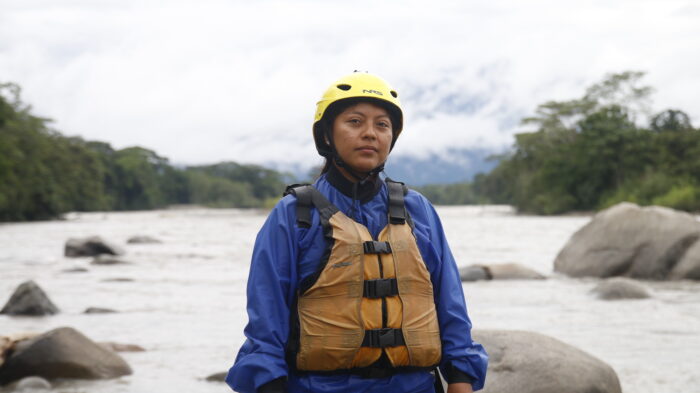
Was it at that moment that the women-led Indigenous guard came to be? How did you begin to organise?
In 2016, alongside other young people in the community, we began to realise that we needed to empower women in the Amazon. Leo Cerdo launched the Hakhu project, which is all about making handicrafts and selling them online. We women started to get together regularly: we would run workshops around recuperating weaving techniques, one here and there to talk about designs, another to bring together all the pieces we had designed… We started as a group of seven to nine women, later growing a little more. Now in the Artisan’s Association, we are 14.
We started to become a really empowered group because we had economic independence, but also because we had independence of thought. We were able to generate income for our families so we didn’t have to depend on the men going off to mine; we didn’t have to go out rain or shine under the heat of the sun picking plantain, yuca, and other regional products. Instead, we’d be sat comfortably making a necklace or some earrings, and we’d sell them for the same price as we’d have earned going out to work all day, tiring ourselves out. This started to create a change in women’s perception. We said to ourselves: ‘why would we get involved in mining or in oil companies, if we have our own source of income?’
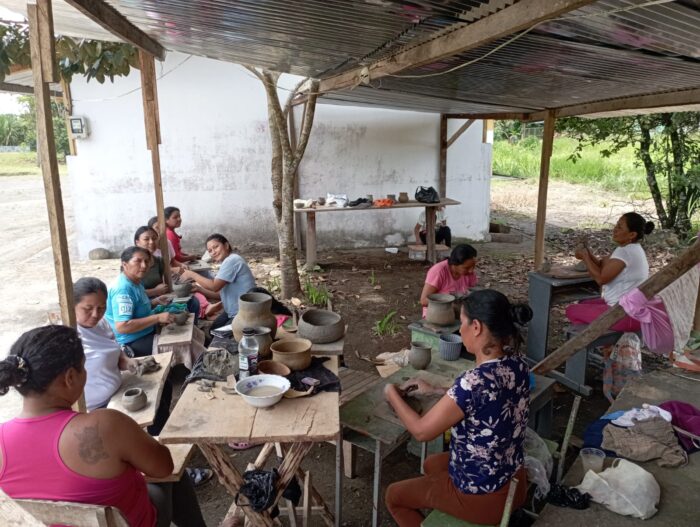
When we were notified [in 2020 that Napo province had been concessioned for gold mining], the women, together with some young people from the Ecuadorian Amazon who had been involved in an audiovisual workshop, went out to march. We went out there asking: ‘How is it possible that after so many years of being forgotten now they want to come and enter our territories to mine them?’ We said, ‘we are not going to allow any of this.’ It was the women who sowed the seed.
After that, other women in the community and nearby areas said that they would not allow it either: ‘We are with you, comrades, sisters,’ they said. And they started to get together.
Now we are around 30 women who are permanently active in the group, but with our sisters and compas both inside and outside the territory, we are more than 40. And the beautiful thing about all this is that now men are supporting us too. It has been very, very difficult to break with the machista idea that we are ‘crazy’, but now the community supports us, from the heart. They know that we are protecting the territory not only for ourselves, but for everyone.
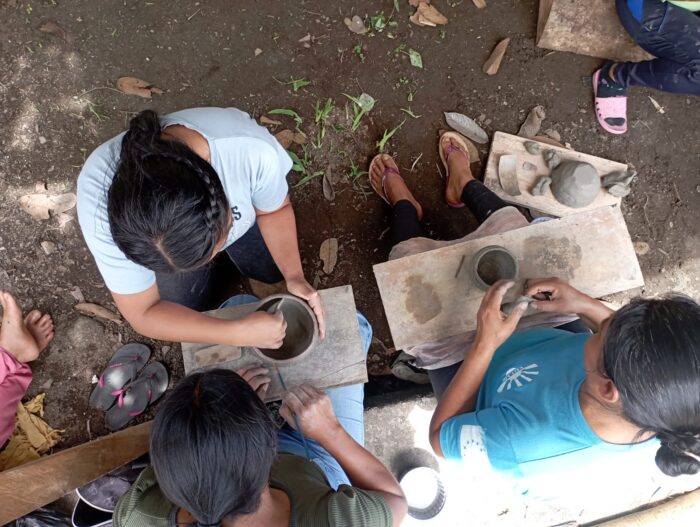
What makes Yuturi Warmi different from other Indigenous Guards? How do you work?
When we declared ourselves a Guardia Indígena, there was some skepticism, because people said that women couldn’t be guards. The perception of an Indigenous Guard in Ecuador – and in all of South America – is that of armed men who go out defending the territory. We took a closer look at what an Indigenous Guard should be. We decided that if the men weren’t going to do what they ought to – get together, organise, and expel the miners – then we’d do it ourselves.
What is different about us is that we have a much broader view and we also try to focus on the many small things that are important for defending our territory. We have six areas of work. The first is guardianship and territorial defense. Second is handicrafts, because that is how this group was born, it is who we are. Third, education, because we promote intercultural and bilingual education for the children and women of the community. Fourth, ancestral medicine: since we began our struggle during the pandemic, this medicine has been our savior; we must ensure that we do not lose it. Fifth, tourism: we want to focus on a different kind of tourism that’s based on resistance and which is conscious of the impacts of disingenuous ‘ecotourism development’ in which Indigenous communities are not taken into account. And the last one is culture, in general: our traditions and our ancestry as Kichwa people.
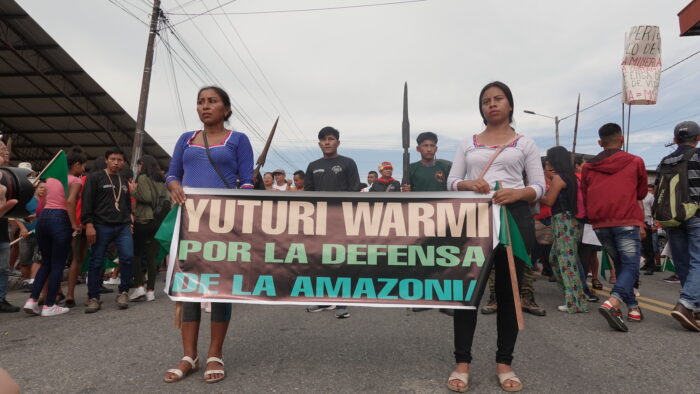
We encompass all of this. It was difficult for us to try to separate out these different aspects, because really without unifying these approaches, we can’t defend our territory: if our language is lost, if our ancestral practices are lost, we won’t have an Indigenous Guard, we won’t have a territory in harmony. It is important to be aware that more than one aspect must be remedied for us to protect the territory. Yes, the physical aspect is important, because we want to expel the mining companies from our territory, but it’s also about the internal – our spirit, our culture, and our meaning of life.
Was there machismo around the establishment of a women’s guard? What challenges have you faced?
There is so much skepticism, but it is because of the patriarchal structure of our society; it’s not so much to do with being Indigenous. At the beginning of the project, the men threw away the muyus [seeds] we used for handicrafts and hid our knitting needles. They would say to us: ‘This is no good, you’re better off going back to the farm to work.’ Once they realised that the economic alternative generated serious income, they helped collect and separate the seeds to make handicrafts themselves. This acceptance was gradual, but it was heartfelt, because the change was visible.
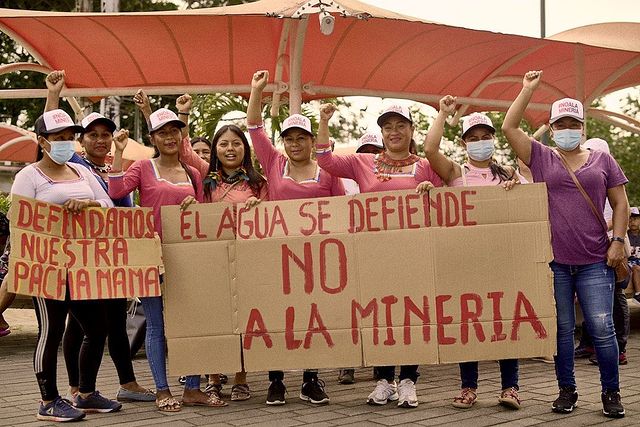
In the city, other Indigenous organisations would say: ‘These crazy women; they’ll only support us for a while, then they’ll forget about it.’ That’s what we consistently heard: ‘They’ll be shouting here for a while, but sooner or later they’ll have to go back to their chacras (gardens), to cook and take care of their children and their husbands, because they’re going to be deceived.’ We women said it doesn’t matter; what our husbands do is their responsibility, but we need to preserve the territory for our children and grandchildren. That’s what motivates us to continue.
We were united. We went out to the marches, to protest and to support other women who have also been victims of political violence in the city. People started to recognise us because we had a strong presence. We began to go out to nearby cities, to march in solidarity with our Sápara sisters, for example, always offering protection and sisterly support – sorority is a word that is just beginning to be understood here. We are sisters who need each other. If they lose their struggle, we lose ours. If we lose ours, they will also feel more vulnerable.
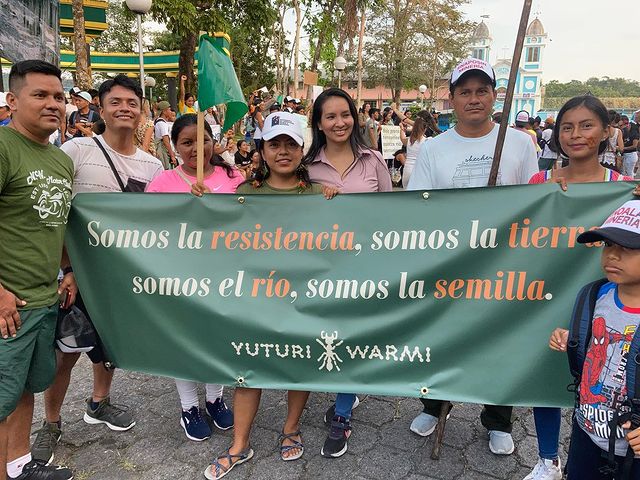
How does the organisational structure of Yuturi Warmi work? What activities do you carry out?
You could say we’ve adopted our structure from other Indigenous organisations, but we have our own president. She is a very fierce woman: her name is Elsa Cerda. We say that she is our comandanta, because she is the leader of the whole group and she is the one who is in charge of this struggle. We, as a guard, are slightly different from traditional guards, because we are also an association.
Within Yuturi Warmi we not only dedicate ourselves to territorial defence in a physical way, touring the territory and working on protection tactics – we do do this – but we also have another vision, because we are women, because we are mothers and daughters. We feel and organise ourselves in a different way than men do. We also have meetings to share what’s going on, we hold meetings to remember how Kichwa plates and cups were traditionally made with clay and not with products from outside of the community. We have a secretary and also a treasurer who administers the funds with which to manage the organisation. We have these kinds of structures.
I, for my part, am the coordinator of all the activities that are being done inside and outside the territory.
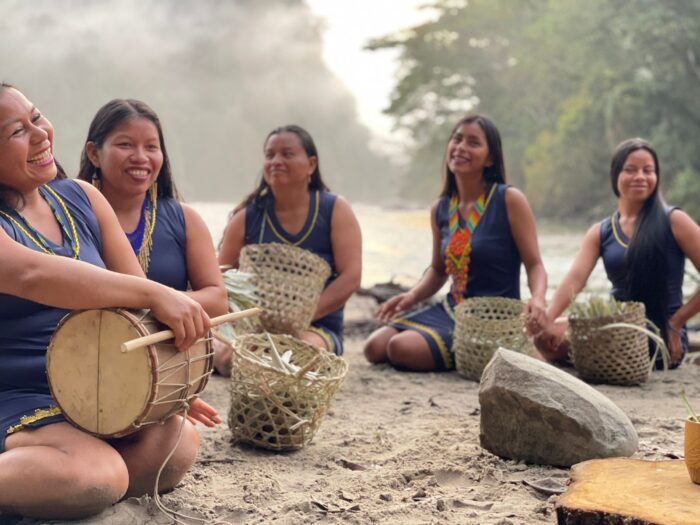
This article is funded by readers like you
Only with regular support can we maintain our website, publish LAB books and support campaigns for social justice across Latin America. You can help by becoming a LAB Subscriber or a Friend of LAB. Or you can make a one-off donation. Click the link below to learn about the details.Support LAB
As a women’s guard, what have you achieved in your fight against mining in your territory?
Yuturi Warmi understands that the anti-mining struggle is a collective struggle, and that it will not be achieved if we only have the help of the community and us women who are organised, but it will be achieved through joint work with the Indigenous organisations which we belong to – in this case, FOIN (the Federation of Indigenous Organizations of Napo) – and also with the city-based collectives who have been very attentive and active with everything that is being done.
Together we have achieved two important milestones. On February 14, 2022, an operation was carried out to remove and seize the machinery in Yutzupino [a community upriver from Serena towards Tena]. More than 150 backhoe loaders were removed and the miners were also expelled from the sector.
Another important milestone is that the provincial court, when we filed a class action lawsuit, issued a partially favorable ruling, recognising the violation of the rights of nature. However, it was a loss when the rights of the Indigenous peoples were not recognised. On the other hand, within this same partially approved sentence, recently the Court also ruled that the planned restoration and reparation of the damaged area must be complied with. However, this has not yet happened. The only thing we achieved through the sentence is that the competent ministers who did not carry out the entire restoration process were dismissed.
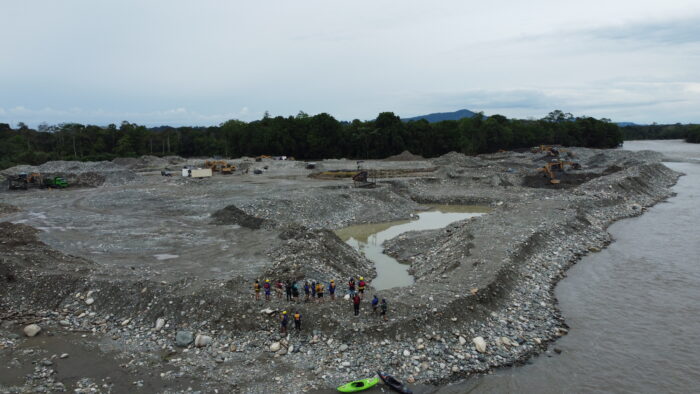
We want to expel the miners from our territory. The mining operations are constant, they occur daily. Illegal miners – which they all are –, but those who are currently operating, are always there and we have been spreading the word through social networks, sending reports to the authorities so that they are removed. It is a long process to achieve the total expulsion of the mining companies, but it is a process that is happening little by little, day by day.
Have you found a listening ear in the Ecuadorian State?
The only direct response from the State has been in the courts. That is the only response they have given us. They have told us that they are not the ones mining, that it is the fault of the illegal miners, and they have just excused themselves.
The relationship we have had with the government has been very tense. Firstly, because the authorities that represent the State, in this case, those who are legislating, are the Assembly members. They have also been involved in corruption scandals. When the machines were seized, it came to light that many of the local authorities, like the mayors, owned machinery inside the illegal mining sites. The relationship is very tense with the assembly members; they have also been linked to networks of mining concessions that have been irregularly approved. We Indigenous peoples were never consulted.
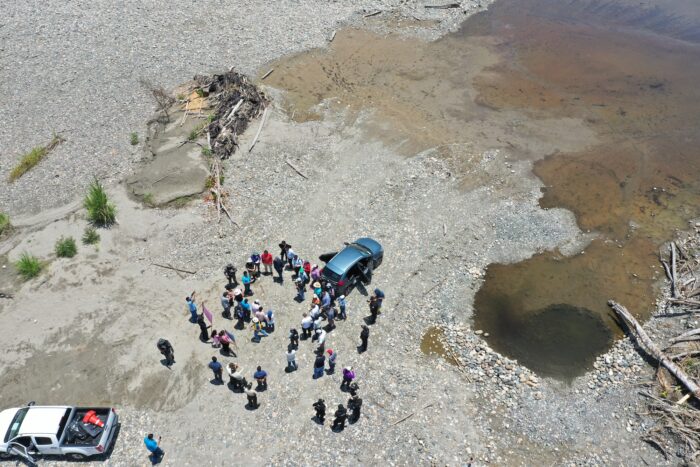
What lessons have you learned from working as a collective?
What I always keep in mind is what my grandmother taught me. I reaffirm it on a daily basis with my sisters: everything we do, everything we are and everything we will be is for the community and for the territory we come from.
When I’m speaking in international spaces, it is not just my voice, as Majo Andrade, that I share, but the voices of all the girls in our community, of all the young women who are giving me their support, of all the mothers and grandmothers who give me their wisdom and also of all of our ancestors, who trust us to continue defending the territory that they left as an inheritance for us. They wanted us to live here, they saw in their future that we would grow up here. All those voices, all that strength that we feel – their strength – always accompanies us.
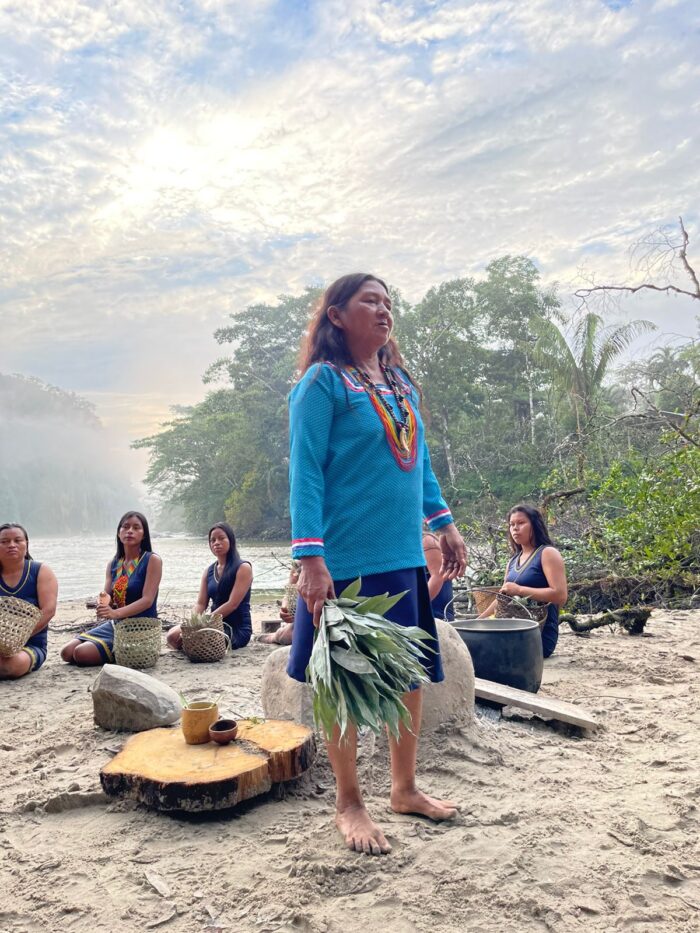
What is the relationship between the younger and older members of Yuturi Warmi?
In 2021, one of the strongest grandmothers of the association passed away. We remember her every day and we will never forget her. She set the bar very high for us. She taught us that we always have to be ready with our spear, to keep it close, as well as our shigra [woven bag] and cuya [bowl] when we go out anywhere.
When she passed away, it was very hard for us, we were devastated, because she was a pillar for us. However, we felt that she was with us at all times: in the marches, in the chants, and in the songs of struggle and resistance that she taught her daughter. The grandmother’s name was Rita Tapuy.
We believe a lot in our abuelitas. Serena was founded by four big families and we are all cousins, we see each other as brothers and sisters. We are all one family.
Currently we have very few grandmothers: we have three wise women still alive in the community. We respect them a lot, we listen to them, we are always attentive to them. Above all, because they are the ones who are keeping the language alive. Two of them do not want to speak Spanish and only speak Kichwa and, although my own grandmother passed away several years ago, what they all teach us is that we have to respect our grandparents and love them all as if they were our own.
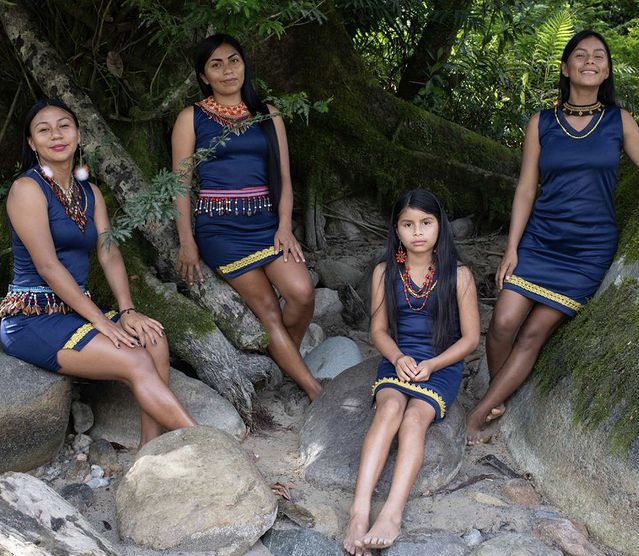
The relationship between us all has always been one of support, of communication, of being able to talk. We encourage each other. We young women understand that thanks to all the wisdom of our ancestors and our grandmothers, we can continue to live in community.
We are very interested in learning ancestral practices and traditions. We feel proud to belong to our people, to tell our mothers not to be ashamed, not to hide because we are Indigenous. It has been an exercise of support and also considering all the situations we went through at home. For us, this connection, this reminder that we have to be united, arises from the need to be together: young people, girls, mothers, grandmothers.
What collective learning have you gained thanks to this way of organising?
Hope and resistance. We look at each other today and we barely recognise ourselves in comparison to how we were three years ago. Before, we would never have come out to speak in public, to confront corrupt politicians, judges who see us only as crazy people and who thought that our traditional knowledge had no worth.
We hope to continue resisting, because we are going to continue having children, we are going to continue living in our territory, we are going to refuse to be eradicated little by little. This is our inheritance. Everything is for our future generations. The fact that we continue to be violated will not take away our will to keep living.
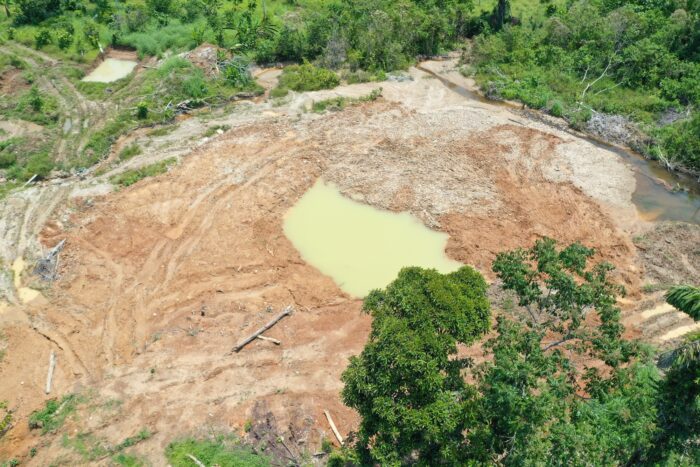
You have been to national and international meetings, how useful is it to leave the territory and take a message outside the communities to the decision makers?
The value is in this process of reciprocity. I go to the meetings knowing that my family and all the women support me, that I am not speaking only for myself, but for all of us. And perhaps not only for the community, but also for other sisters and for the alliances we have made along the way.
At the same time, we head to these international spaces to knock on doors and touch people’s hearts, telling them about our local work in the hope that they and the world will listen to the true meaning of life.
The value in this for me is that I am echoing the voices of women who perhaps did not have the opportunities that I had, but who continue to have the support of an entire people, of an entire community, because that is who we are. Not all of us will always be able to leave the community, but the value is in how we coordinate, how we give back, how we feel as a community.
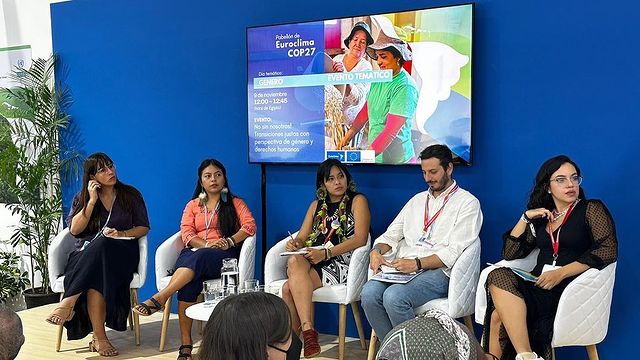
Nowadays, a lot of attention is being paid to what we Indigenous peoples are doing and they say that they are taking us into account, but that is not the full truth. They have opened many national and international spaces for us, but there is still this bias of: ‘You are not capable of generating alternatives on your own, someone always has to support your projects.’ There is this figure of the ‘vigilator’ or the ‘observer’, – they do not let us, as Indigenous peoples, continue to manage our own issues.
That is what angers me, because this invalidates our whole process, a whole issue that has been going on for two or three generations. My grandparents worked hard, walking thousands of kilometers so that their children could have a place to study, just like my parents. Now that we, a few young Indigenous people, have managed to get our university degrees, they tell us: ‘We are going to assign you a technician, because you can’t manage it yourselves’. This is hugely unfair to our historical struggle.
There are very few of us Indigenous youth who also speak a dominant language, such as Spanish or English, in our cases. I didn’t learn English because I have parents who speak the language, I had to learn it by force in college. It has been one of the platforms with which we are making ourselves known. We are raising our voices, because we do not want third parties to speak for us.
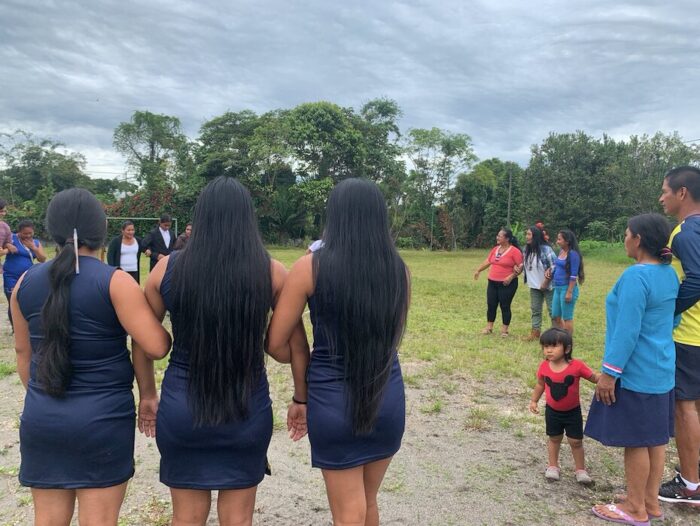
What does the word ‘territory’ mean to you?
Territory, for me, is life itself. It is not so much about the physical representation of the territory, but about the spiritual, the company, the people and the state of mind in which I find myself when I am in my territory. Here I feel I am in my safe space. Territory is who I am: my body and my ancestry. My territory always goes with me when I am outside. What I ate as a child is reflected in who I am now. Territory means not forgetting everything I am, everything I have learned, no matter where I am. Territory can be understood as the physical but, for me, it is what I carry with me: life.
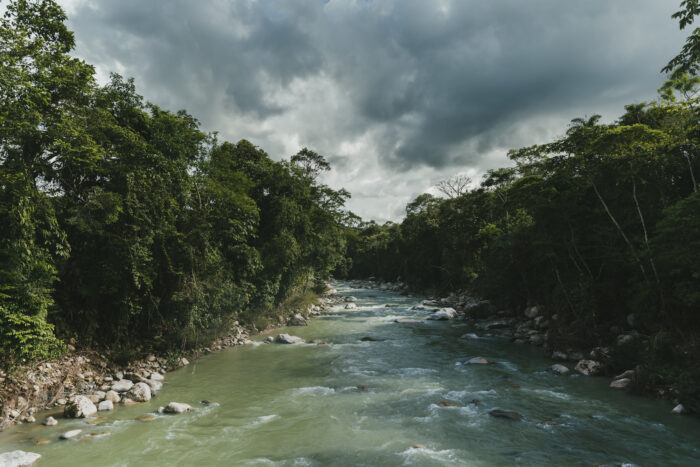
*Main image: Yuturi Warmi Archive
LAB spoke to Majo Andrade Cerda and fellow community leader Leo Cerda at the United Nations Permanent Forum on Indigenous Issues on 18 April 2024.
Leo told us: ‘The Jatunyacu river in Serena is dying. Terra Earth and Black pearl are killing all life in it with mercury and no one is stopping them. The problem is the machinery, is that they use mercury and other metals. Terra Earth (the Chinese company) and Black Pearl (the Canadian company) are using mercury and dumping waste into the river. It is illegal to use mercury in Ecuador, but the government is doing nothing. ‘ He reports that the river has changed colour.
Majo reported that mercury from the gold mining is poisoning the fish and that she cannot risk having a baby as she does not know what damage the mercury has done to her body. She does not know if the mercury in her body will threaten the health of her baby.
Both stated that Serena is the last of 26 villages along the river holding out and saying no to mining. The rest have been taken over by mining. Majo reports that Free, Prior, and Informed Consent (FPIC) is not working, as the mining companies are simply making agreements with the government. She says that she and her family are followed by illegal miners because they said no to the mining companies.
Majo emphasises that that they need international support. Please share this interview.
Follow Sounds and Colours: Facebook / Twitter / Instagram / Mixcloud / Soundcloud / Bandcamp
Subscribe to the Sounds and Colours Newsletter for regular updates, news and competitions bringing the best of Latin American culture direct to your Inbox.

